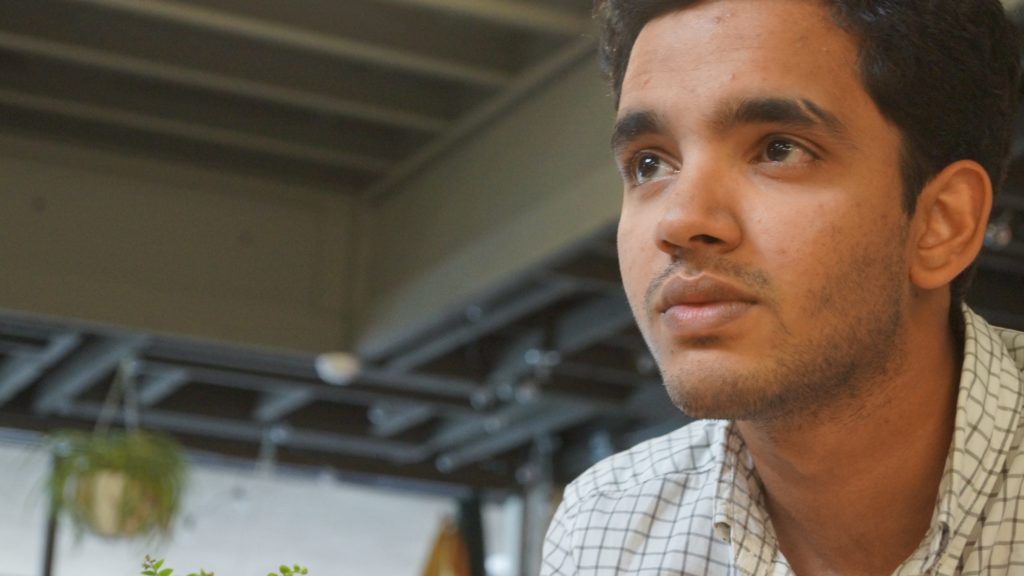
At $6 trillion, the global food retail market is one of the world’s largest industries — but one that has not yet been substantially disrupted by online marketplaces, which have otherwise effectively changed the way many people buy books, clothes, electronics, and almost anything else. In an age where durable goods may soon be delivered by autonomous drones, most of us are still making the trip to the local grocery store. So, why haven’t online marketplaces changed the way we get our food?
With his new venture Movebutter, SCET alum Chai Mishra has a created a new kind of food delivery service that he calls “the supermarket of the future.” Mishra believes Movebutter will not only change the way we shop for our food but will also make the entire food value chain more affordable, equitable, and ethical.
While working for a farm-to-table coffee company in Germany, Mishra talked with farmers all day long. This is where he realized that the supply-chain for coffee (and most other food) was overly complicated and contained too many middlemen. Most of the coffee farmers he worked with were making just seven cents per pound of coffee they produced. At the same time, the coffee would take six months to reach the consumer, causing reduced freshness and quality. Living on a tight budget at the time, Mishra thought that there must be an alternative to the current supermarket-centric supply chain to help farmers get their fair share and consumers to get higher quality, cheaper food.
By working directly with farmers and other food producers Mishra believes he can deliver higher quality food at a cheaper price, “Let’s say you spend $50 at the supermarket. $10 of that is going to the actual value of the food and $40 is going to the supply-chain. Thirty percent of the food in grocery stores gets thrown out. That’s another thing you are paying for. You’re going to be paying for a thousand other things, but not good food,” said Mishra, “So, the entire premise was: do enough people know about this?” Mishra felt so compelled to change the food system that he quit his job in Germany and moved back to Berkeley to start Movebutter.
“I felt like a whistleblower,” said Mishra.

Chai Mishra, SCET alum and Founder of Movebutter
Mishra believes the reason that past food delivery services such as Webvan failed, and the reason current ones are floundering is very simple: people just don’t trust the food.
“How do you trust the Instacart driver to pick the best avocado?” asked Mishra.
Mishra believes he can solve the trust issue and enhance the experience of shopping for food online by offering fewer, higher quality items, “The average supermarket has 50,000 items, we have 500,” said Mishra. Similar to brick & mortar stores like Trader Joe’s, Movebutter will have a small number of hand-selected items, so that no matter what the consumer purchases, they can be confident that it will be high quality.
While there are still user experience challenges to having an online food store (e.g. you can’t smell a piece of fruit to analyze its freshness), Mishra believes there are opportunities to make the experience even better than the supermarket. For example, Movebutter can show you a video of how your peanut butter was made or an interview with the farmer who produced it.
Beyond the promise of cheaper, higher quality food and an improved experience, Mishra also believes that improving the way the food supply chain works can help eliminate food deserts and help lower income people attain high quality food at a lower price. He is currently seeking approval for the ability to take EBT (food stamps) in order to accommodate those in need.
“Supermarkets very much create food deserts. You can drive up Shattuck Ave. and you will find one after the other beautiful supermarkets where everyone is having lovely conversations about non-GMO and organic, and you drive down Shattuck and it is the worse food desert in the entire country,” said Mishra. By decentralizing the supply chain from the supermarket, and offering lower prices on higher quality food, Mishra believes Movebutter’s model can help connect more people to nutritious food.
Mishra says that he owes a lot to SCET Managing Director Ken Singer for introducing him to entrepreneurship, “The most meaningful experience at Berkeley was taking Ken’s class. Ken introduced me to startups, entrepreneurship, and Silicon Valley. I didn’t know what a startup was, I really didn’t. That was the first time I was introduced to it and after that, the bug was just in me.“
Movebutter is currently delivering to homes in the East Bay and is testing in neighborhoods in San Francisco. You can try their service or get more information by visiting their website here.
